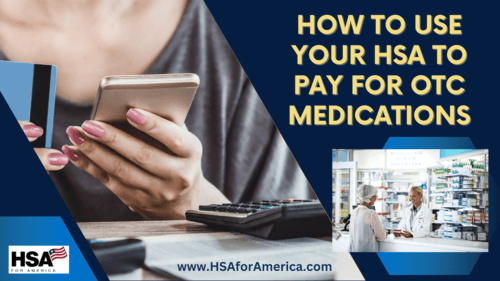Until recently, you couldn’t use your health savings account (HSA) to pay for over-the-counter (OTC) medication.

You could only use your HSA to buy prescription medications, and still have the IRS count it as a qualified medical expense.
That changed in 2020 with the passage of the CARES Act, which added both non-prescription medications as well as feminine hygiene products as authorized medical expenses.
In this guide, we’ll explain how to make the most of your HSA, especially for OTC medications, and ensure you comply with IRS guidelines.
Compare Pricing on the Best Insurance Plans Available
The CARES Act
In response to the COVID-19 pandemic, the CARES Act expanded the list of authorized medical expenses for HSAs.
Notably, this includes OTC medications, making it easier for individuals to use their HSA funds for a broader range of healthcare needs. You can find a comprehensive list of authorized medical expenses in IRS Publication 502, which serves as a valuable resource for understanding what you can and cannot purchase with your HSA funds.
HSA Debit Cards: Your Simplest Option
Nearly all HSA custodians now issue debit cards to account holders.
These HSA debit cards are the easiest and most convenient way to use your HSA funds to buy OTC medications, or just about anything else.
These cards work just like regular debit cards but are linked to your HSA account. When you use them to purchase eligible medical expenses, the transaction is automatically recorded, simplifying your record-keeping.
Requesting Reimbursements
If you don’t have an HSA debit card or prefer not to use it, you can still use your HSA funds for eligible expenses.
In this case, you’ll need to keep your own records of your purchases.
Here’s how to request a reimbursement:
- Keep Your Receipts. After making an eligible purchase, keep the receipt as proof of the expense. Ensure it includes the date, the name of the product, and the amount paid.
- Contact Your HSA Provider. Reach out to your HSA provider to initiate the reimbursement process. This can usually be done online or over the phone.
- Submit Documentation. Prepare the necessary documentation, which typically includes a reimbursement request form and copies of your receipts. Submit these to your HSA provider for processing.
- Keep Records: It’s crucial to retain copies of all documentation related to your HSA transactions. This documentation is essential in case of an IRS audit.
What Happens If an HSA Transaction is Disallowed?
Sometimes, an expense you thought was eligible may be disallowed by your HSA provider or the IRS during an audit.
In such cases, you may need to repay the disallowed amount to your HSA, and it could be subject to tax penalties.
Corrective Action. If you receive a notice from the IRS regarding a disallowed expense, take corrective action promptly. Consult with a tax professional if needed to address the issue correctly.
Compare Pricing on the Best HealthShare Plans Available
Conclusion
Maximizing your HSA to cover OTC medications and other authorized medical expenses is a smart financial move, made easier by the CARES Act and recent IRS guidelines.
Remember, HSA debit cards are the simplest way to manage your HSA funds, but proper record-keeping is crucial if you choose alternative methods.
For personalized guidance on how to make the most of your HSA and optimize your healthcare finances, schedule a free consultation with a Personal Benefits Manager.
They can provide expert advice tailored to your specific situation and help you navigate the intricacies of your Health Savings Account.
More on Maximizing the Value of Your Health Savings Account: How To Use Your HSA To Pay For Nutritional Supplements | Using Your HSA for Transportation Expenses: A Comprehensive Guide | Level Up Your HSA Game With These Three HSA Investment Strategies | How Much Can An HSA Save In Taxes?

